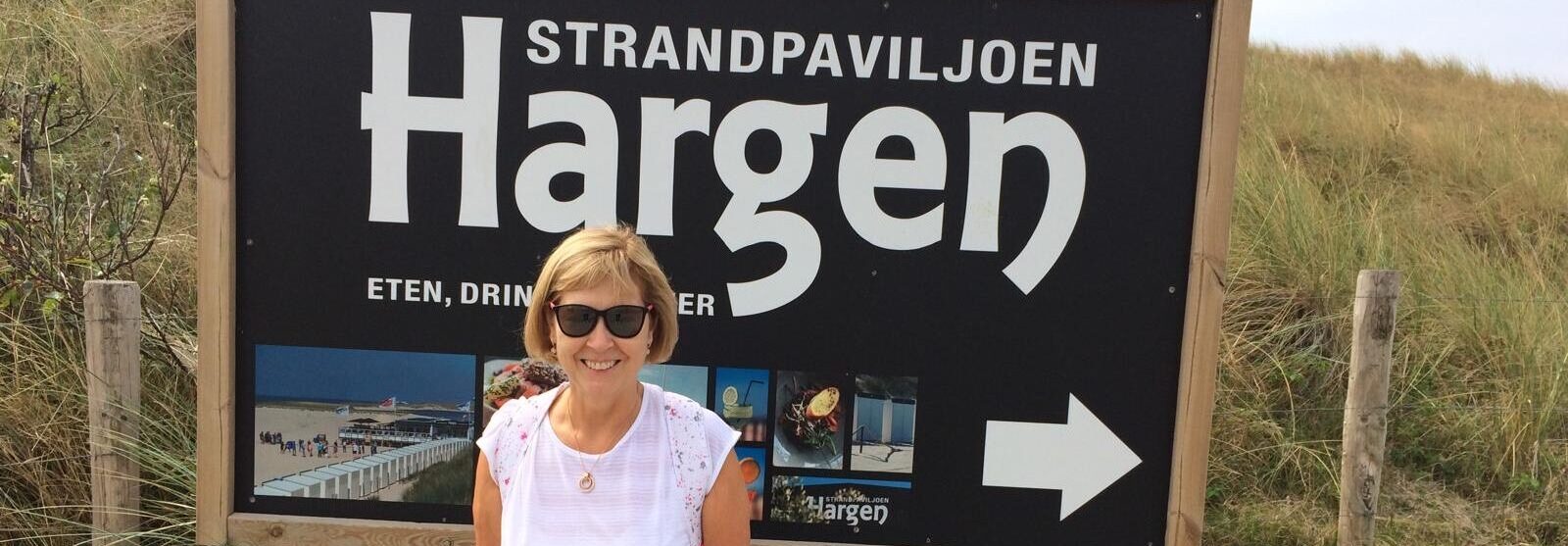
28 Jul 2025
“The odds were against me but I was given hope and I want to pass that on”
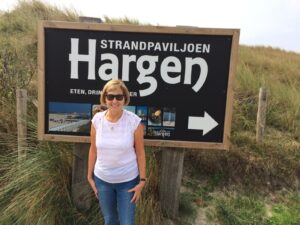
Mary in 2018 before her diagnosis
“The odds were against me but I was given hope and I want to pass that on. During the lowest points in my treatment one doctor said to me this is going to be brutal but if your body and the strength of your mind can take a stem cell transplant, it’s going to give you another 30 years. It was what I needed to hear and I held onto that fact. I wasn’t ready to give up.”
Acute lymphoblastic leukaemia (ALL) is one of the most common childhood cancers with a survival rate beyond five years of over 89%. However the figures for older people are very different. Here Mary describes her shock at being diagnosed with such a rare and serious cancer, and how she held on to hope throughout her gruelling treatment.
“I felt like I had the flu with shivers and a bad headache,” said Mary, 66, who in 2019 was working as a sales manager in the motor industry in London. “I had a really busy life and job, I was married to my wonderful husband, I had a grown-up son, I was a regular at the gym, I was fit and happy. I thought maybe I was overdoing it, but after around a month whatever it was just wouldn’t go away.”
Mary went to the doctor to ask for a blood test to see what was behind her symptoms and was shocked at what happened.
“He really didn’t want to do it. He had a young trainee GP sitting next to him and when I asked him for the blood test he tutted at me, turned to her and said: ‘we get this all the time you know’. It was awful – he was the senior doctor in the practice. But I persisted and said I really felt there was something that wasn’t right. Reluctantly he pulled the forms out from his drawer and I had the blood test that afternoon.”
Next day the surgery called her back and told her to expect to hear from St Helier Hospital near her home in Sutton, Surrey.
“I hadn’t got a clue what was going on really although my husband Simon said it didn’t sound like it would be good news. The hospital rang me when I was driving home from work and I pulled over. The consultant asked me where I was and made sure I was safe and then told me I had leukaemia. It felt like every bit of blood was draining from the top of my head down into my feet. I thought I was going to pass out. I spotted a can of Coke my young nieces had left behind in the car and shakily drank it and fortunately the sugar did help. He said I needed to go home, pack a bag and get to the Royal Marsden at 8am the next morning.”
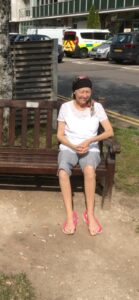
Mary during her treatment
On 15th February 2019 Mary was diagnosed with B-cell acute lymphoblastic leukaemia (ALL). She was 60 at the time. The blood cancer is exceptionally rare in her age group. 790 people of all ages are diagnosed with ALL each year – just 120 of them are aged over 60. Survival rates are far higher in children, who form the majority of cases. The five year survival rate for those under 15 years is 89.5, but at age 40 it drops to 26.3%.
“The nurse had taken a whopping 18 vials of blood when I was admitted, and then they took me into a broom cupboard sized room crammed with two nurses, the head of haematology, two more medics, Simon and me. The consultant said I had ALL, it was very rare, and the success rate in adults was very low, and I would only live two to four more weeks without treatment, but that he promised to do everything they could to save my life. Again I felt that thumping in my ears as if I was going to pass out, and I saw Simon standing next to me, at 6’3”, physically shaking. It was terrible to hear but I clung onto the hope from the promise they gave me.”
Mary had a bone marrow biopsy which showed 88% cancer in her blood.
“I was in hospital for five weeks of chemotherapy and that first round really wasn’t that bad. I was in the day room doing yoga most days, with the odd bit of nausea but nothing terrible. But at the end of it the consultant said it hadn’t worked and they needed to step it up ahead of giving me a stem cell transplant. That was very scary.”
Mary spent the next nine weeks in and out of hospital on a more aggressive chemotherapy regime which left her so sick she was put on a drip multiple times.
“I also lost my hair at this point. I phoned Simon one morning and said can you bring in a plastic bag for me. I’d woken up with it all over my pillow. I didn’t want it shaved so I just pulled it all out and put it in the bag. This was the time I also started dramatically losing weight. I was 11 ½ stone when I was diagnosed and just 7 stone after my transplant.”
Three of Mary’s six living siblings had had cancer so weren’t suitable as stem cell donors, and tests revealed the other three weren’t a match.
“I was so upset when they told me. But then miraculously Anthony Nolan found me a 100% match – a 19-year-old student in this country. I write to him anonymously every July to thank him – and last year he wrote back saying: “I was so happy to have saved your life.”
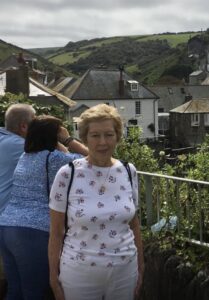
Mary during her recovery
Mary’s transplant took place on 19th July 2019. While ultimately the treatment saved her life, the side effects afterwards proved to be the most gruelling chapter in her recovery.
“As soon as the transplant was done I started vomiting, and I just couldn’t stop. Most patients are allowed home after three or four weeks but I stayed for nine. I was violently sick the whole time, I couldn’t stand, I had to use a wheelchair. They tried so many things and never gave up, but I know they were really at the last resort when they put me on a combination of two new drugs. It worked within three days. I thought I was finished with this world but they always gave me hope.”
Once Mary was well enough to go home she began trying to regain her lost muscle mass and strength, which she says took her around two years overall.
“At first I had to shuffle upstairs on my bottom and crawl to the bathroom and then Simon would haul me up onto the toilet. I needed a frame to walk. I was absolutely tiny. But I was also absolutely determined to get back my life. The good thing was I was in remission, the transplant had worked. I was making good blood cells again but my poor body took a while to catch up.”
Mary is now back to swimming, tai chi, yoga and the gym. She retired from work when she became ill, and she and Simon decided to move to Warminster in Wiltshire. She has just trained as a volunteer tour guide at Salisbury Cathedral and gives her time at a food bank in Warminster once a week.
“I have exceeded any expectations I would have thought possible after being so ill. I do talks for Anthony Nolan to help people who are thinking of going on the stem cell register understand the impact of their donation. And I try every year on the anniversary of my transplant to go back to the hospital to thank the doctors and nurses. They always say to me ‘we can’t believe you made it, you’re such a success story!’. I have walked the Marsden March for the last four years raising money for this amazing hospital which saved my life. I raised £1500 this May.
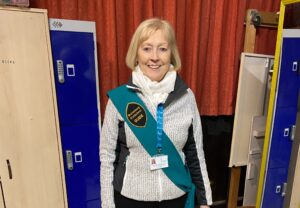
Mary now, post treatment and recovery.
“The odds were against me but I was given hope and I want to pass that on. During the lowest points in my treatment one doctor said to me this is going to be brutal but if your body and the strength of your mind can take a stem cell transplant, it’s going to give you another 30 years. It was what I needed to hear and I held onto that fact. I wasn’t ready to give up.”
Share your story
We want to help people tell and share the leukaemia stories that matter – stories like Mary’s and stories like yours.
Related posts
18 November 2024
Leukaemia UK’s Patient Care Pioneer Award fuels innovative research to revolutionize ‘watch and wait’ approach
Leukaemia UK is excited to announce Professor Francesco Forconi from University Hospital Southampton (UHS) as the first recipient of its Patient Care Pioneer Award. Through this new funding initiative, Professor…
4 August 2020
Our life-saving work must continue
Leukaemia and other blood cancers don’t stop for coronavirus (COVID-19) and our vital research and care must continue
4 September 2022
Worrying numbers of leukaemia patients are being misdiagnosed or waiting too long for a blood test, say leading UK leukaemia charities
Patients in the UK face “the luck of the draw” when presenting with leukaemia symptoms. GPs are often left without adequate support to provide blood tests or process the results…
21 September 2022
A record year for Leukaemia UK London Marathon runners
62 runners put their best feet forward for Leukaemia UK A record 62 runners are taking part in this year’s London marathon to help fund vital research into leukaemia diagnosis,…